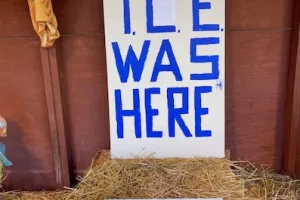Text: Dr Gemma Simmonds at St Martin in the Fields Romero Service

Dr Gemma Simmonds CJ
Dr Gemma Simmonds CJ, gave the following address at the National Ecumenical Service 'Let Us Dream - Unmasking a Post-Covid Future with St Oscar Romero, held at St Martin-in-the-Fields Church in London on Saturday 13 March. The service was led by Revd Richard Carter.
Back in 2019, in the alternative universe we lived in before Covid, I can remember sitting on a bus and looking at some of my fellow passengers. Their appearance and language suggested that they were not native British, and they were wearing masks. 'How very odd these foreigners are', I remember thinking to myself, 'whatever is it that they're so afraid of? You'd think we were all carrying some deadly disease…' Well, two years on, we all now know what kind of thing it was that they and we have become so afraid of. What seemed to me then a harmless, if somewhat neurotic foreign peculiarity has now become the norm for everyone as we struggle to save our own and each other's lives in the face of a deadly pandemic. The wearing of masks has become a banal, everyday nuisance, or a fashion statement, or an issue of ideological conflict, but it has also become a metaphor for the moral and philosophical questions raised by the pandemic itself.
A year ago, as the pandemic raged across Rome and the rest of the world, Pope Francis stood alone in the dark and the driving rain in St Peter's Square and blessed the world in the name of Christ. He looked a lonely and vulnerable figure as he raised the body of Christ like a battle standard, yet there was strength hidden within his apparent weakness and a wisdom beyond the philosophies of this world as he spoke of his dream for a better future. His recent book, Let Us Dream, asks:
'Look at us now: we put on face masks to protect ourselves and others from a virus we can't see. But what about all those other unseen viruses we need to protect ourselves from? How will we deal with the hidden pandemics of this world, the pandemics of hunger and violence and climate change?... If we are to come out of this crisis less selfish than we went in, we have to let ourselves be touched by others' pain.'
These words could just as easily have been preached in one of the famous homilies of St Oscar Romero, a man of virtue who, in his early days, liked to play it safe. He lived in circumstances of desperate threat and danger in the chaos of El Salvador. His clerical status and his conservative approach to unrest within church and society protected him from the worst of what was being suffered by the poor who surrounded him. He was certainly aware of their plight, he suffered an anguish of sympathy in the face of their suffering, but it was at a relatively safe distance. And then everything changed. The suffering came close to him through the death of a friend and brother priest, Rutilio Grande. Five other priests were murdered within the following two years, along with hundreds of lay catechists and ordinary Christians. Through Grande's example, Romero did what has become so mortally dangerous in our present crisis. In the words of Pope Francis, he 'touched the suffering flesh of Christ in others'. It was that close encounter with others' suffering that cured him of what Pope Francis describes as 'existential myopia', our inability to see what is in front of our eyes.
Pope Francis' comment about unmasking and the example of Oscar Romero's life and preaching pose a considerable challenge. Most of us spend a great deal of effort precisely trying to avoid being touched by pain, whether our own or that of others. Isn't it a reasonable form of self-preservation to do so? Suffering weakens us, it renders us vulnerable, it exposes us to danger. Of late, not only we as individuals but our entire society has become acutely alert to this in the calamity of Covid. Yet we are reminded by Pope Francis that a calamity offers opportunity as well as threat. In our current situation danger lies on all sides, but Francis quotes Friedrich Hölderlin's Hyperion, whose lines have been significant for him at different points in his life, 'Where the danger is also grows the saving power', and later he sets the whole world a challenge, 'We must not let the current clarifying moment pass us by'.
The current clarifying moment. Well, that's one way of describing it… But how clarifying is it, exactly? Early on in the pandemic a friend sent me a picture of the globe wearing a Covid mask. The logo read, 'don't let's pray to go back to normal: normal was the problem in the first place'. The theme of unmasking is both implicitly and explicitly common to both these great prophets and pastors of Amerindia and it takes up the central message of today's reading, 'For nothing is hidden but it will be made clear, nothing secret but it will be known and brought to light. So, take care how you hear; for anyone who has will be given more; from anyone who has not, even what they think they have will be taken away.' (Luke 8:17-18) But what will be given to us, and what is it that we stand to lose? Amid all the masks that we now wear for fear of contagion, Francis claims that 'Covid has unmasked the other pandemic, the virus of indifference, which is the result of constantly looking away, telling ourselves that because there is no immediate or magic solution, it is better not to feel anything […] This crisis unmasks our vulnerability, exposes the false securities on which we had based our lives.' We are rightly shocked and grieved by the tens of millions who have suffered from Covid and the millions who have died, but he reminds us that in the 1st 4 months of 2020 3.7 million people died of hunger. That is more than all the people who have died of Covid so far.
Danger shakes us when it comes to our front door but passes us by when poverty, suffering and exclusion become banal and unremarkable. If we have managed to avoid the relentlessness of suffering hidden but deeply embedded within our social and economic systems, then we also avoid the God who cries out for our attention in the cry of the poor. It was precisely when Romero stepped out of the protective clerical circle in which he lived and allowed his vulnerable and unprotected self to be exposed to the gaze, the touch and the lives of the poor that he became a true member of the revolution of tenderness preached by Pope Francis.
The relative privilege in which we live as dwellers in the so-called developed world shields us from the most distressing aspects of poverty. But this also prevents us seeing the light of Christ shining from the lives of those who are excluded from and on the margins of society. St Paul reminds us that 'The god of this world has blinded the minds of unbelievers' (2 Cor.4:5), but the minds of believers can be similarly blinded. We need to learn again to see, and Romero believed that for this reason the world needs the church. But a blind church Is of no use to a blind world. The church, too, needs to learn to see again.
It is common currency to refer to Romero as a prophet, but that is a word too easily used with little reflection. One of Romero's biographers remarks that 'prophets are not simply pious social critics; they are also dreamers who dare to imagine a world where God is King, and for this reason they are persecuted.' Part of the prophet's role is to throw light on the meaning of what is happening all around us. When the University of Leuven awarded Romero an honorary doctorate in 1980 he made a speech in which he adapted the famous saying of St Irenaeus, 'the early Christians', he said, 'used to say, Gloria Dei, vivens homo - the glory of God is the living human being. We can make this concrete by saying, Gloria dei, vivens pauper - the glory of God is the living poor'. In his masterwork on Romero's theological vision Edgardo Colon-Emeric remarks that in his transformation of Irenaeus' words, Romero was offering an example of ressourcement from the margins. The ressourcement theologians of the Second Vatican Council led the church on a journey of renewal by returning to the sources of patristic wisdom. Romero leads us by a return to the sources of wisdom found in the Gospels themselves, the words and acts of Jesus who preached the good news of God's reign to the poor and those on every kind of margin.
When a bomb blew up the radio station Voz Panamericana, technicians worked for a week to repair it so that Romero's Sunday homily could be heard. He preached at the risk of his life and spoke of Christ not only by preaching sermons but being himself a sermon. He spoke of Christ being the best microphone of God and his hearers, as the church, being the best microphone of Christ. 'Each one of you', he said, 'wherever you are, needs to live the life of faith fiercely because you are a true microphone of God our Lord in your context. Thus the church will always have preaching'. Romero's sermons had an outreach of which few preachers can dream. It's estimated that 73% of the rural population and 47% of the urban population heard his sermons. When a further bomb destroyed the radio station again many came to the Basilica the following Sunday carrying tape recorders so that they could rebroadcast Romero's sermon. Those who were politically and socially as good as dead found a voice through that of their pastor. The crucified Christ speaks through his crucified people both to the world at large and to the church through and to whom he speaks. Romero was accused by his enemies of preaching violence, but he claimed that the only violence he preached was that of love; 'the violence that left Christ nailed to a cross, the violence that one does to oneself to overcome one's selfishness so that there may not be such cruel inequalities among us… 'The violation of human rights', he went on, 'the marginalisation and destruction of God's image bearers, constitutes a denial of the incarnation that must be repudiated'.
Romero discovered for himself that the faces of the poor unmask the paternalism implicit in many of the church's ministries. Charity from a safe distance is not enough. What we need to be praying for this Lent and every Lent is conversion as he was converted. Many of his biographers speak of Romero's conversion from religion at a safe distance to a radical discipleship. It is not that he was previously in different to the plight of the poor, but he saw it as something effectively separate from himself. Michael Lee, one of the most eloquent commentators on Romero's life and legacy, tells us that for him conversion was both a turning from and a seeing anew. Romero himself described as a 'coming home' his growing commitment to immerse himself in the reality of the poor and his participation in efforts to make the world more resemble the reign of God and God's will for human flourishing. This conversion was not so much a radical change as an evolutionary process.
Covid has unmasked for all the world to see the blight of poverty, sexism, racism, slavery and forced migration that have lain hidden from our gaze in plain sight. Romero's evolutionary conversion calls to us more powerfully than ever to a new vision and an ongoing call to deepen our faith in a fundamental option which involves our life in its entirety and lasts until our dying day. Like the blind man in Mark's gospel, we have already been touched by Jesus, but we don't recognise what we see. Our prayer must be in to be touched again so that we can see reality more clearly and respond to it wholeheartedly. Such a touch will above all breach the dualistic separation between the spiritual and the temporal which continues to exist in the hinterland of most of our minds, despite our denials. With the eyes of our faith renewed we will no longer be able to spiritualize our faith in a way that escapes or ignores the pressing issues of our day. We will move beyond personal acts of charity to an inescapable realisation of how sin is active structurally in our world and to full participation in the changing of the structures.
In one of his homilies Romero prayed for the conversion 'of those who do not collaborate in the construction of a more just temporal order', who 'are able to transform society because they have power in their hands'. We all have power as people with voices and choices, as consumers, as voters. Every Christian is called by nature of their baptism into Christ to be prophet, priest and king. This is our prophetic voice, it is the meaning of our participation in the priesthood of all the baptised and the establishment of the reign of God. I quote again Romero's homily, 'let me remind you what the church teaches: that the social structures, the institutionalised sin in which we live, have to be changed. All of this has to change… The names of the victims change, but the cause is the same. We live in a situation of inequality, of injustice, of sin; and using the force of arms, paying to kill the voice that speaks out, is no solution… What will work is if each person in their own position - from the government, capital, labourers, landowners - strives to change things: more justice, more love'.
In a conversation with a Jesuit friend Romero remembered the poverty of his roots but also the way in which joining the clerical caste removed him from those routes to a safe and comfortable distance. It was when he was made a bishop that he was confronted once again with extreme poverty and, in his own words, came back home. He said, 'You know, Father, when a piece of charcoal has already been lit once, you don't have to blow on it much to get it to flame up again'. We can easily rest in the self-satisfaction of believing that our individual acts of personal asceticism and charity are enough. They are not. True conversion happens at the intellectual, the moral and the affective levels of our lives. Once the world has been unmasked, once our eyes have been opened, we can never see the world in the same way again.
Pope Francis believes that our current crisis may reveal or unmask the God who has been hidden to so many by the false securities of the political and economic systems which have flourished to the advantage of the tiny minority and the massive disadvantage of the majority and by the superficiality and individualism of contemporary culture. 'Walking together', he says, 'listening to what the Spirit has to say to the Church, means allowing for the apparent purity of our positions to be unmasked, and to detect the tares growing among the wheat'. A sacrament is a sign which makes real what it signifies. If the church is to be a 'sacrament of salvation' then its mission is to be the living presence of Christ in the world, enabling all within and beyond it to taste in a partial way the fruits of salvation in justice, peace and radical love. 'The tradition that Christ entrusted to his church', Romero taught, 'is not a museum of souvenirs to be protected […] It has always a view to the future […] Here and now, we are still the authentic body of Christ in history […] While Paradise will never be found here on earth, yet I want this earth to reflect the paradise toward which we journey. This is the reign of God that must be established on earth, A reign that many people do not want and yet a reign that is most necessary. Even if one must die as a martyr, this reign must be preached and announced.' You and I may not be called upon to die as martyrs, but we are most certainly called upon to live as martyrs, that is, as witnesses to the call of Christ in the poor and the marginalised to this daily, evolutionary conversion. If we can commit to this, then we will at last know what it truly means to be Christian. The name Romero means 'pilgrim'. If we need a companion to help us on our way, then, in the Saint of El Salvador, we could not find a better one.
St Óscar Romero, pray for us.
Watch the service on Youtube www.youtube.com/watch?v=TMFNWChl7NY


















